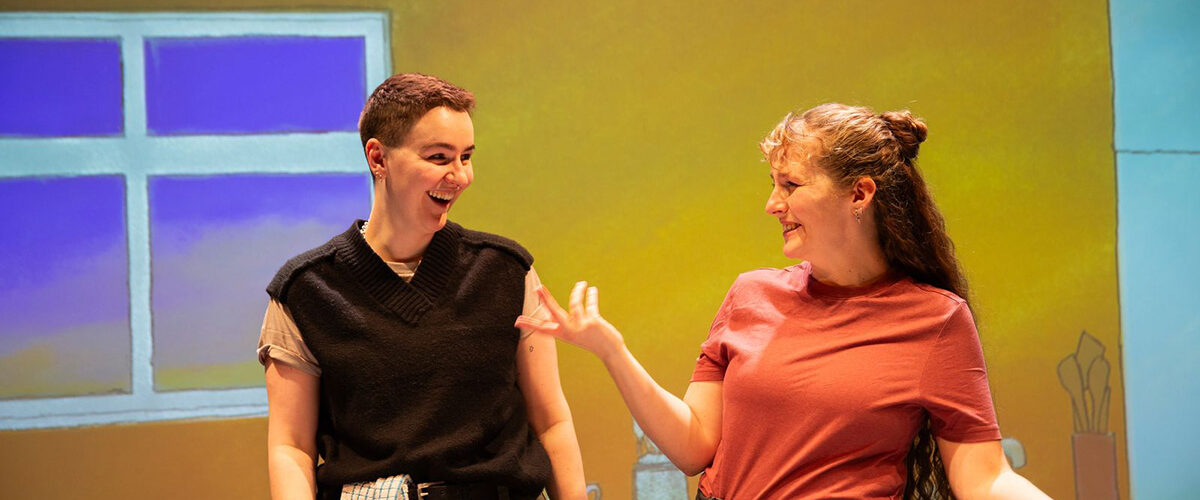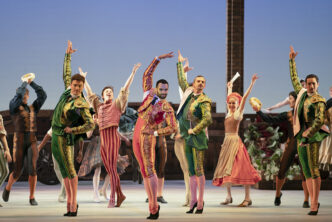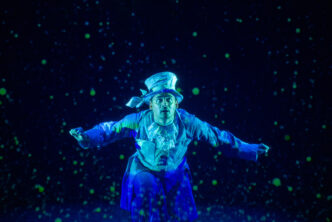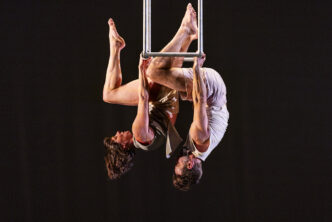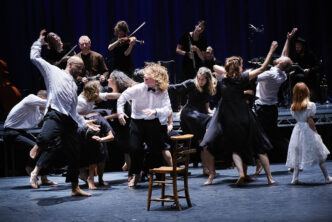Actor and poet Zoë McWhinney is coming to Home, Manchester in a new extended production of Eloise Pennycott’s award-winning play, Barrier(s). She talks to Quays Life about breaking barriers as a profoundly deaf actor and what it takes to credibly tell a story using British Sign Language on stage.
You recently finished your run at the Royal Court in ‘Deaf Republic’. How did it feel to share your work as a sign language poet on such a prominent stage?
Zoe: “It was an amazing privilege to work on such a high-profile production with Dead Centre, with that level of production values. The set, aerial, puppetry, and technical spec of the production was impressive and the reception from Deaf audiences was great. Some people have commented that this was their favourite translation of the Deaf Republic poem. The whole thing was really unbelievably inspiring and I hope the production builds on its success and continues to thrive as a production. Everyone has said they absolutely loved the set, the signed dialogue and loved the translation. It is a huge honour to receive this praise from the poet author. Following Deaf Republic’s successful opening run at the Royal Court, I know there is a lot of enthusiasm for further performances after the Dublin run and I hope to see it on tour in the future. The whole experience was incredibly positive”.
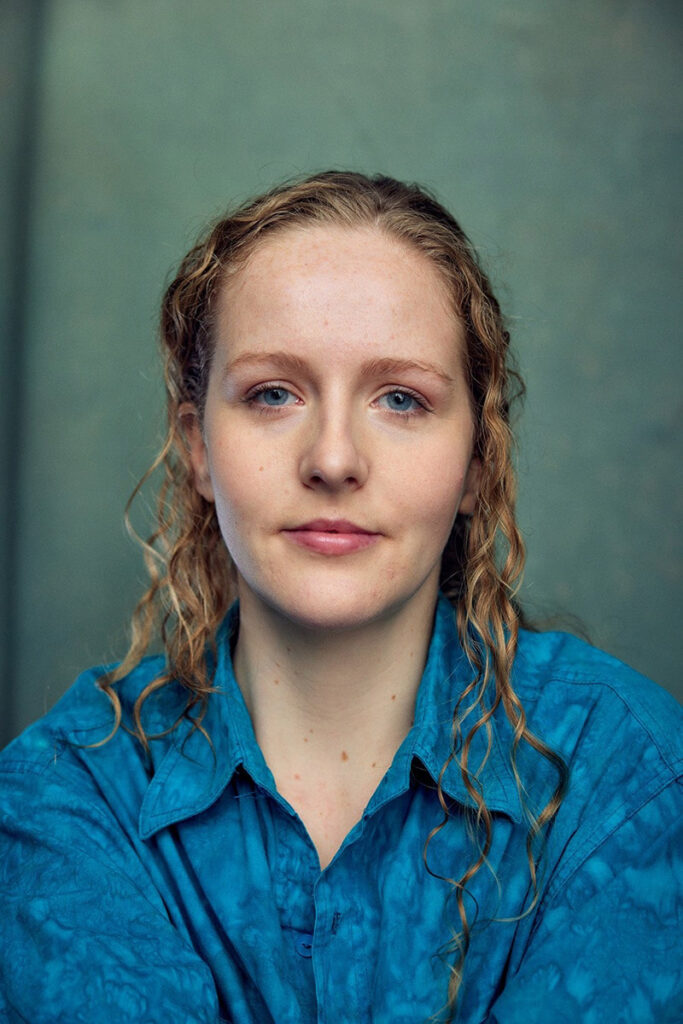
You’ve also worked as a consultant for the RSC. What do you think is most important for hearing people to understand about representation of the Deaf community on stage?
Zoe: “I think the most important thing for hearing people to understand is that in order to work in a production with dialogue in BSL, they would need to already have a grasp of this language because if hearing actors don’t know sign language already, it’s not possible to teach them a language from scratch that will have any believability, certainly to a Deaf audience. Also, a hearing perspective on the Deaf experience can only ever be superficial, so it’s vital to have Deaf creatives in collaboration and there are plenty of hearing actors who are CODAs (child of a deaf adult), or have Deaf family or who otherwise sign, who can be cast alongside Deaf characters (played by Deaf actors), so there is credibility for those relationships/interactions and this is where, I believe, so many productions fail, because they don’t think of or understand this.
“Importantly, casting panels need to have Deaf representation so that they can accurately assess a person’s sign language skills or proclivity for taking on and learning some BSL and often this is totally overlooked by an all hearing casting team, which is hugely frustrating, as it adds a huge burden and extra work, not to mention the time cost associated with teaching BSL, additional time for script translation and necessity for BSL consultancy roles to support actors with text translation and I feel like we need to move away from this model of using BSL consultants as the ticket to achieving cultural sensitivity when there is so much more involved in achieving cultural credibility than merely ensuring the dialogue is signed well. It’s about how events happen, how characters relate to one another in the context of the play”.
Following Eloise Pennycott’s New Views competition win, Barrier(s) was first staged as a short play at The National Theatre. How has it developed for this new production?
Zoe: “So, I didn’t get to see The National Theatre staging of Barrier(s) after it won the New Views competition, but I know it has evolved a lot since then and of course Eloise has written more scenes for the play and the characters of Katie and Alana’s backstories have developed a lot and influence the play’s overall narrative arch and the building of the world of the play”.
Can you tell us a bit about your character Katie? What drew you to this role?
Zoe: “My character, Katie, like me, is profoundly Deaf, from a strong Deaf family that has a multigenerational line of Deafness in their genes. Katie talks about the barriers her parents and grandparents faced and this resonates with me, as someone coming from a long line of Deafness. Katie is not a saint and she’s not the perfect victim. It’s really nice for me to play a complex character who isn’t perfect. She’s cheeky and I think people either love her, or hate her, which is what real life is like, and it makes her a fun character to play. There are of course some really tough themes in the play and Katie goes through a lot, so I have empathy for her”.
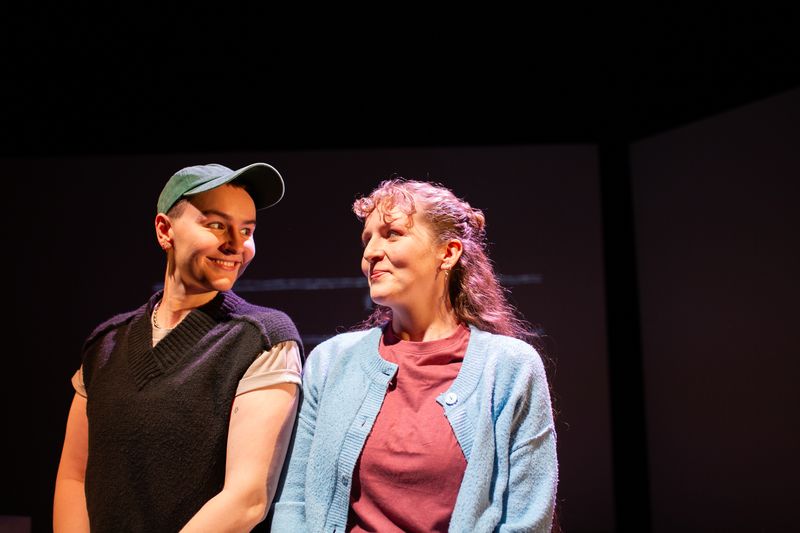
How does it feel to be the first actor to create this role in the full-length version of the play?
Zoe: “I feel really lucky to be offered the opportunity to play and improvise during rehearsals. It has been a really fun process and it’s been amazing to be able to discuss directly with Eloise, the writer of the play, and the creative team throughout the writing and rehearsal process, to have all the differing perspectives that feed into the narrative and the two characters themselves. It’s been a real privilege to be part of the first production of the play and its future legacy”.
Barrier(s) explores connection through language and its barriers. How do you think this theme will resonate with audiences?
Zoe: “I think the modern world of social media, people being censored on and offline with what they can and cannot say – language being policed? – current police arrests for people using particular language etc. means that the play’s themes of connection through language and its barriers are very relevant.
“Also, the way big corporations manipulate through language and the current rush to collect and feed AI language models influences and changes how we all use language and connect. Hopefully audiences will watch Barrier(s) and understand that no matter the language divides we may have, we can still jump over these divisions and connect meaningfully with one another without risk or harm.
“It’s great to see Alana’s character being proactive and learning BSL and we see Alana’s language skills develop through the play, like a kind of timelapse, as the play covers an extended period of time that scenes jump through. I think this could inspire audiences, and maybe some people will make that step to be proactive themselves and learn sign language”.
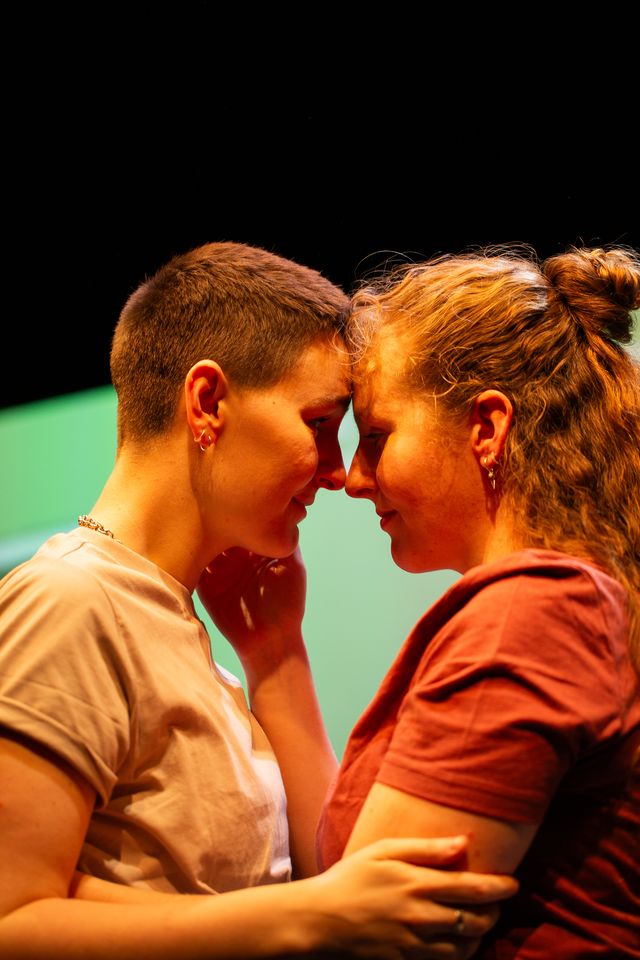
What would you like people to know about the play?
Zoe: “Prepare to be surprised. Prepare to have your mind opened, to discover a world maybe unknown to you, an extra layer of intersectionality you’d not yet considered.
The play is a love story, a lesbian romance about the meeting of two people. I’ve personally worked hard to create scenes that feel authentic, truthful, soft and loving – so you have that to look forward to!”
Deafinitely Theatre’s production of Eloise Pennycott‘s Barrier(s) is at Home, Manchester from 6-8 November 2025. Age recommendation 14+ The play is also touring to The Rep, Birmingham, before ending its run at Camden People’s Theatre in November.

